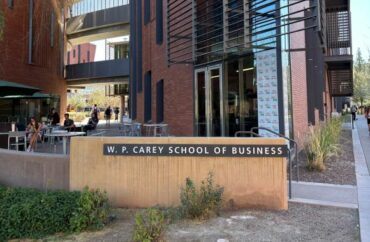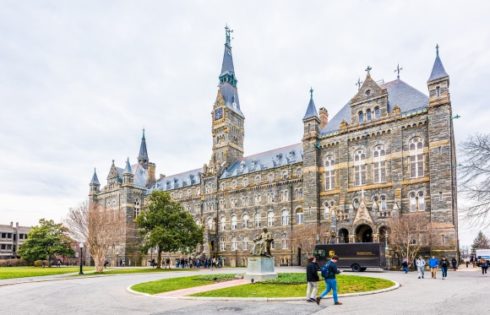
Professor accuses school of discrimination under ‘Inclusive Excellence’ while university insists compliance with federal law
Arizona State University is “reviewing all executive orders by President [Donald] Trump as they are issued and as they are considered by the courts,” a university spokesperson told The College Fix this week.
“In addition, we are reviewing the Dear Colleague letter dated February 14, 2025, issued by the U.S. Department of Education. ASU will comply with all applicable law,” the spokesperson said. The letter threatens to pull federal funds from campuses found to discriminate on the basis of race.
In a recent Substack post, ASU Professor Owen Anderson flagged W.P. Carey School of Business’ webpage for its “diversity, equity, and inclusion” programs.
The page states that the school is “committed to inclusive excellence” and “global thinking.” It then links to “specific resource pages for several multicultural communities,” including “people of color,” “LGBTQIA+,” “women,” and more.
The school also boasts a “Council of Inclusive Excellence” that “meets monthly, and focuses on driving school initiatives to meet faculty, staff, and student needs.”
“The W.P. Carey School is not just virtue-signaling—it’s engaging in systemic discrimination under the guise of ‘equity,’” Anderson wrote.
The professor also wrote that the school’s online materials show its “focus on myths like the so-called gender pay gap and their program in the ‘color of money,’ which argues that outcomes prove racism—standard cultural Marxism.”
The university cannot “continue applying for federal funding and student loans while failing to comply with federal law,” he wrote.
Asked about which specific laws the school may be violating, Anderson told The Fix via email he is “not a lawyer” and therefore “not qualified to say they are for certain violating the law.”
However, President Trump’s “Ending Radical And Wasteful Government DEI Programs And Preferencing” order bans “DEI as a basis for discrimination against persons who are deemed ‘not inclusive,’” Anderson said.
“Redistributing resources based on race and gender is the definition of racism and discrimination,” he said.
MORE: Lawsuit targets U. California system, alleges race-based admissions practices
“Universities get away with calling it ‘inclusion’ but what they mean is they want to include some who they have defended as ‘underrepresented’ but aren’t concerned about who they define as already sufficiently represented,” he said.
Anderson isn’t the only one taking issue with ASU’s “Inclusive Excellence” initiative.
John Sailer, senior fellow at the Manhattan Institute, told The Fix that “these policies push universities to redefine excellence for the sake of a kind of social engineering project, and they often make certain controversial ideas about race, sex, and identity into a kind of de facto campus dogma.”
“Many DEI programs seem tailor made to obscure an institution’s real policy and to cover up practices that are raise legal red flags,” he said. “ASU’s program seems to fall into this category.”
“Everything depends on what promoting ‘inclusive excellence’ actually looks like in practice. Too often, behind closed doors, a policy that on paper is about feel-good generalities like ‘inclusion’ ends up creating a smokescreen for racial preferences,” Sailer told The Fix.
Asked about the definition of “Inclusive Excellence,” a university spokesperson told The Fix it is “a term that reflects ASU’s commitment to admitting all students who are qualified to attend the university under the university’s admission standards (without regard to their race, sex, color, ethnicity or national origin) while providing those students with an education at the highest levels of excellence through a faculty of distinguished scholars.”
ASU also adheres to the Arizona State Constitution, which bans the university from favoring individuals based on race, sex, color, ethnicity, or national origin in employment, education, or contracting, the university spokesperson told The Fix.
As a result, every student—regardless of these traits—can access all support services and resources offered by ASU and the W.P. Carey School of Business, the spokesperson said.
Meanwhile, Professor Anderson is suing ASU over its “Inclusive Communities” faculty training.
He alleges the university’s mandatory DEI training for faculty violates a 2022 state law that forbids public agencies from requiring employees to engage in staff instruction “that presents any form of blame or judgment on the basis of race, ethnicity or sex,” The College Fix previously reported.
A judge has ruled the lawsuit may proceed.
MORE: University of California children’s hospital sued for ‘teens of color’ program
IMAGE: Gabrielle Temaat
Like The College Fix on Facebook / Follow us on Twitter






Please join the conversation about our stories on Facebook, Twitter, Instagram, Reddit, MeWe, Rumble, Gab, Minds and Gettr.